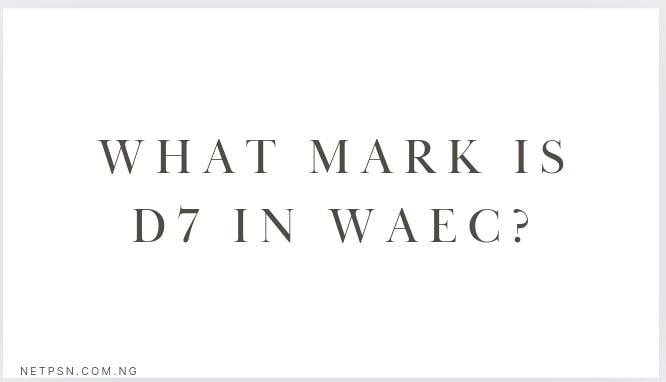Understanding WAEC Grades: What mark is D7 in WAEC
The West African Examinations Council (WAEC) is a prominent examination body in West Africa, responsible for administering various examinations essential for secondary school completion and university admission. One of the grades that students and parents often inquire about is the D7 mark. This article provides a comprehensive overview of the D7 grade, its implications, and strategies for students who receive this mark.
What Does a D7 Mark Signify in WAEC?
A D7 in WAEC signifies a “pass” but it is a lower-tier pass that often falls short of the requirements for major universities in West Africa and beyond. Specifically, the D7 mark indicates a performance that ranges between 50% to 54%. It reflects a basic understanding of the subject matter but suggests that the student’s grasp of the material is not strong enough for higher academic pursuits without further study or remediation.
Academic and Professional Implications of a D7 Grade
University Admissions
Most universities in West Africa, including prestigious institutions like the University of Lagos or University of Ghana, require at least a C6 grade in relevant subjects for admission into degree programs. Therefore, a D7 might not meet the cut-off mark for many courses, particularly competitive ones such as Medicine, Engineering, and Law. However, some colleges may accept D7 grades for less competitive or diploma courses, providing students a pathway to further their education.
Scholarship Opportunities
Scholarships, particularly those that are merit-based, often have stringent grade requirements. A D7 grade may limit the opportunities available for scholarships, as most organizations opt for candidates with higher grades that demonstrate academic excellence.
Strategies for Improving Academic Performance on D7 in WAEC
For students aiming to overcome the setback of a D7 in WAEC, the following strategies can be effective:
- Focused Revision: Identify weak areas within the subject where the D7 was obtained. Utilize resources like past WAEC papers, study guides, and tutoring to reinforce understanding.
- Exam Technique Training: Sometimes, poor grades are not a reflection of a student’s understanding but rather their exam technique. Training in time management, question analysis, and structured answering can help improve performance.
- Re-sitting Exams: WAEC offers students the opportunity to re-sit exams for subjects where they feel they could improve their grades. This is a direct approach to turning a D7 in WAEC into a more favorable grade.
The Role of Teachers and Educational Institutions on D7 in WAEC
Educational institutions and teachers play a crucial role in guiding students towards better performance. Regular assessment, targeted feedback, and additional support for weaker students can make a significant difference in their final grades.
Conclusion
While a D7 in WAEC examinations is considered a pass, it does have limitations that can affect a student’s academic and career opportunities. It is essential for students, parents, and educators to understand these implications and explore viable paths for improvement or alternative career routes.
By comprehending the implications of a D7 grade and actively seeking solutions, students can navigate their academic and professional journeys more effectively.



















+ There are no comments
Add yours